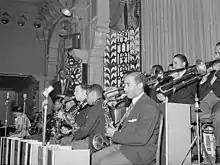Savoy Ballroom (Chicago)
The Savoy Ballroom in Chicago, United States was opened on Thanksgiving Eve, November 23, 1927 at 4733 South Parkway.[1] The Savoy was heavily funded and its size was unprecedented on the South Side of Chicago with elaborate decor, a triple subfloor, and a checkroom that could accommodate 6000 hats and coats.[2] Originally featuring primarily Jazz artists, including Louis Armstrong, Count Basie, Duke Ellington, Earl Hines, Stan Kenton, Dizzy Gillespie, Billie Holiday, Ella Fitzgerald, Gene Krupa, Woody Herman, the Savoy also hosted other activities, such as boxing, figure skating, and basketball exhibitions featuring the Savoy Big Five, who would later change their name to the Harlem Globetrotters.

.jpg.webp)
From 1927 until 1940, there was continuous music supplied by two bands per night. When one band took a break, the other would go on. During these years, the Savoy was open seven days a week. Although most of the Savoy's patrons were black, growing numbers of white Chicagoans visited the Savoy.

The Savoy closed in 1948, and was demolished in the early 1970s. The site is now home to the Lou Rawls Theater Cultural Center.[3][4]
External links
- Photos of roller-skating at the Savoy
- "History of the Savoy at Jazz Age Chicago". chicago.urban-history.org. Archived from the original on 2004-03-24.
References
- Jeniece Drake. "SAVOY Online". SAVOY Online. Archived from the original on 28 January 2007. Retrieved 30 December 2012.
- Brothers, Thomas (2014). Louis Armstrong: Master of Modernism. New York, NY: W.W. Norton & Company. p. 289. ISBN 978-0-393-06582-4.
- "Jazz Age Chicago--Savoy Ballroom". Jazz Age Chicago. Archived from the original on 13 June 2011. Retrieved 30 December 2012.
- "Jazz Age Chicago--Regal Theater". Jazz Age Chicago. Archived from the original on 22 July 2011. Retrieved 30 December 2012.